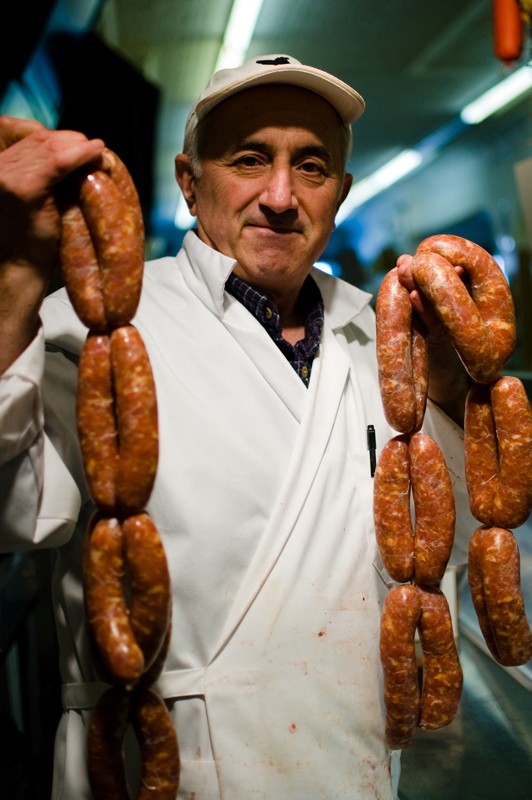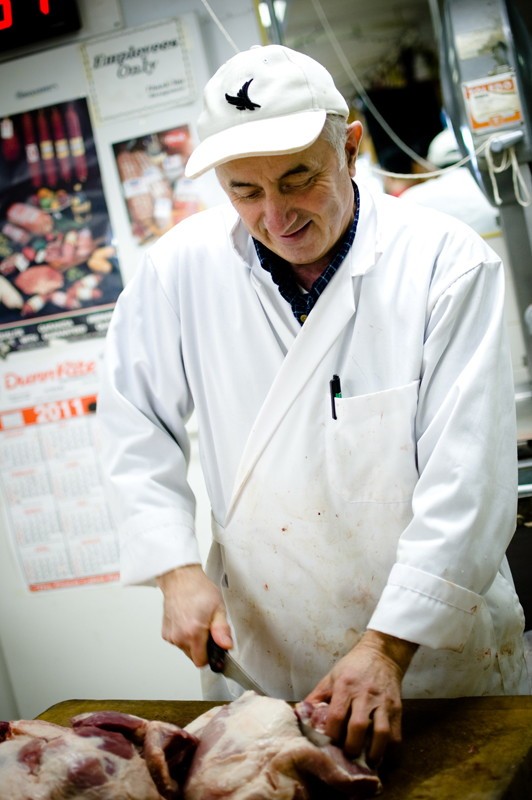Going back to tradition
Big grocery chains may offer convenience, but more and more consumers are finding their way back to their local butcher
The local butcher shop used to be a routine stop for most families in past decades, but has gradually been losing competition to the convenience of a one-stop-shop supermarket.
But, like most other things that become corporatized, the personal aspect disappears and quantity usurps quality. For these reasons it seems that local Winnipeg storeowners in the meat industry are seeing a rise in interest for their products and service once again, especially from the younger generation.
Barb Funk is the owner of Ellice Meat Market, located at 712 Ellice Ave., and has known some of her customers for over 35 years. Funk’s family bought the shop in 1976, a long-awaited dream come true for her father, a butcher who had been traditionally trained in Austria.
The traditional aspect of Ellice Meat Market is carried throughout the shop from the recipes to the equipment, which, as an old photo album of Funk’s shows, is very similar to the equipment that her father used in the ‘50s, but with a few technological upgrades.
“It’s important to me that where I get my stuff from is very clean and fresh,” said Funk about her high standards for the quality of product she brings in.
“It’s scary what people will feed their kids,” she added of preservative-filled and genetically modified meat and food products.
While Funk believes she has lost business to some of the bigger chain stores, she has noticed an increase in the interest to buy locally again.
“A lot of young people want to get back to that,” she said.
Marcel Joanisse, owner of the Dutch Meat Market, has noticed this interest as well.
Joanisse runs the store with his father but, after learning the trade from other butchers, now does all meat cutting himself.
He says smaller stores like his offer not only the personal level and friendliness that big supermarket chains don’t, but also experience, knowledge, superior product and consistent prices.
Joanisse says that basically every store that sells meat in Winnipeg has to get it from the same places.
For example, all beef comes from Alberta and most pork and poultry is locally supplied to ensure freshness.
But the difference is in how that meat is treated when it gets to the store.
“We age our (beef) product. Supermarkets can’t afford to age their meat,” he said.
The aging process is supposed to take between 14 and 21 days, but according to Joanisse, some of the larger corporate grocery stores can’t keep inventory for that long and so the beef is sold less than ten days after it’s cut, affecting the tenderness and taste of the meat.
“ It’s really a fantastic growing market. Consumers are becoming more aware, people are reading labels on their food and seeing that they’re not good for you.
Tony G. De Luca, De Luca’s Specialty Foods, Cooking School and Restaurant
The Dutch Meat Market is also proud to sell many products that are preservative free, by-product free and contain no fillers, something Joanisse sees customers looking for more of these days.
Joanisse has a website for his store where customers can look up specials and recipes, but his advertising doesn’t extend much farther than that, allowing him to put his money into his product and ensure its quality.
Tony G. De Luca, one of the managing brothers of De Luca’s on Portage Avenue, boasts in his charming Italian accent, “Our advertisers are our consumers.”
De Luca’s started off as a grocery store but has expanded over the years to include a restaurant, a cooking school, a bakery and of course, a butcher counter.
Having grown up in southern Italy on a small farm, it’s no wonder that De Luca’s store emanates a traditional vibe, complimented by the familial atmosphere throughout the entire store.
De Luca says the store has a very loyal customer base - so loyal, in fact, that his customers have actually turned in shoplifters to him before. His sincere interest in his customers is what makes them his best advertisers.
De Luca’s tries to incorporate healthier options and free-range animals as much as possible since the quality and even the taste are much better.
“If you were ever exposed to free-range meat at a younger age and you try it again, you remember the taste,” said De Luca.
He observes that meat cutting/butchering is becoming scarcer because of the way the market is shared by the larger chain stores, but that the demand for quality meat products is rising.
“It’s really a fantastic growing market,” he said. “Consumers are becoming more aware, people are reading labels on their food and seeing that they’re not good for you.”
Although the ability to buy both a T-bone and shaving cream in one fell swoop is rather convenient, it seems that local meat stores and butcher shops are holding their own by providing quality, personality and tradition.
“Having the second generation come in is the greatest pleasure. Unless you give them the values and the old-fashioned tradition, it’s going to get lost,” said De Luca.
Published in Volume 65, Number 20 of The Uniter (February 24, 2011)








